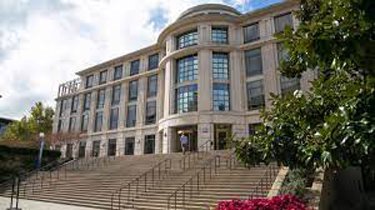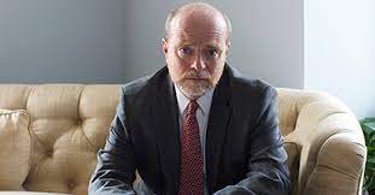
Georgetown Law
Max Eden, at AEI, informs us that Georgetown Law coddles ;eft-wing students who respond to reading a comment they do not like by demanding “reparations,” “free food,” “and a place to cry”(!) by suspending a distinguished professor.
Georgetown University Law Center had long been at the bottom of the law school world’s elite “Top-14” rankings. It maintained its worst-of-the-best status largely by the draw of its physical location in Washington, D.C. It finally slipped below UCLA this year, just when Georgetown Law distinguished itself above and beyond even top-ranked Yale Law in a category not ranked by US News and World Report: leadership. To wit: Georgetown Law Dean William Treanor has proven himself, almost beyond a reasonable doubt, to be the single weakest leader in American higher education.
An examination of Treanor’s leadership by a jury of his peers should convict him of this weighty charge. Last March, someone leaked a video of professor Sandra Sellers lamenting that black students tended to score poorly on her examinations. Treanor publicly condemned her without speaking to her. Georgetown then violated its own policy and American Association of University Professors’ guidelines and fired Sellers without any due process.
I asked Treanor: Why condemn Sellers before speaking with her? Was there an empirical basis for her lamentation? If there was, then why would he find lamenting an empirical truth to be “abhorrent?” I also asked him to comment on what a Georgetown Law student told me: “[B]ecause of [Treanor’s] action, [students] are now terrified of providing any personal opinion or even putting forward ideas ‘for the sake of argument’ in [Georgetown Law] classes for fear that someone might clip their speech and post a video on social media to destroy their reputation and career.”
Treanor provided no comment. He did, however, publicly vow to consider requiring all students to study Critical Race Theory (CRT), to make professor tenure contingent on CRT-inspired “diversity, equity and inclusion” criteria, and insisted that he was “dedicated to the important work that lies ahead.”
In recent weeks, Treanor has rededicated himself to that work.
President Joe Biden announced his intent to nominate a black woman to the U.S. Supreme Court. Anyone who has taken the LSAT can apply analytical reasoning to this prompt. Unless it is known, a priori, that the human subgroup “black women” necessarily contains the most competent liberal jurist, then Biden was logically prioritizing race and sex over competence and merit. Incoming Georgetown Law Professor Ilya Shapiro articulated this logical conclusion on Twitter in a way that anyone with middle-school level reading comprehension would easily understand.
Unfortunately, neither a critical mass of Georgetown Law students nor William Treanor appeared to possess the requisite cognitive skill. The Georgetown Black Law Students Association circulated a petition calling for Shapiro’s termination, and students hosted a sit-in to call on Treanor to meet their demand. At the sit-in, students further demanded “reparations” for the pain of being exposed to a thought they either couldn’t understand or simply didn’t like. They demanded free food. And a “place to cry.” Treanor vowed to “do better.” He started by suspending Shapiro. (The demand from these 20-something adults for a dedicated crying room has not yet been met.)
The self-righteous self-infantilization of Georgetown Law students is a strange and profound sociological phenomenon. But the response from Treanor and Georgetown was more telling still. We can’t ascribe too much personal agency to weak-willed leaders. Their actions, after all, are over-determined by “structural” and “systemic” considerations prescribed by “institutional” forces.
Consider the contrast between how Georgetown handled Shapiro’s tweets, and how it handled professor Carole Fair’s tweets during the contentious Brett Kavanaugh Supreme Court nomination hearings of 2018. She tweeted, at the time: “Look at this chorus of entitled white men justifying a serial rapist’s arrogated entitlement. All of them deserve miserable deaths while feminists laugh as they take their last gasps. Bonus: we castrate their corpses and feed them to swine? Yes.”
Georgetown’s institutional response to Fair was perfunctory. This allegedly Jesuit institution was far more existentially triggered by Shapiro’s banal poke at the sacred cow of race than it was by rhetoric about castration and throwing testicles before swine. You don’t have to be a highly skilled Freudian psychoanalyst to understand the pathological institutional illness on display here. But as long as we live in what some call a “patriarchy,” no one will respect a leader or an institution without any cojones.
Conservatives have argued that Georgetown should not fire Ilya Shapiro. The truth is, Georgetown does not deserve to employ Ilya Shapiro. Nor does it deserve to employ any law professor with an intellectual interest in the study of law as that endeavor existed before Critical Race Theory deconstructed and reconstructed the legal professoriate into an explicitly Gramscian-Marxist hegemonic apparatus.
But Georgetown Law certainly deserves to be led by William Treanor. Treanor is the very model of the modern university administrator: Fearful of all, respected by none

William Treanor, Dean of Georgetown Law School, Yale ’79, Yale Law ’85.





Boligat
Every graduate of every “top” school should have the logo of that school tattooed on their forehead so that the rest of us could laugh at them whenever they go out in public.
McChuck
The acolytes of the Church of the Narrative meet out harsh punishments to heretics and unbelievers. Examples must be made.
McChuck
A few of the Dean’s published works:
Against Textualism,
Taking Text Too Seriously: Modern Textualism, Original Meaning, and the Case of Amar’s Bill of Rights
Training Future Health Justice Leaders — A Role for Medical–Legal Partnerships
Please Leave a Comment!